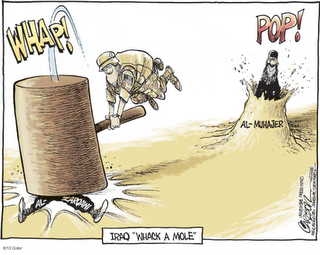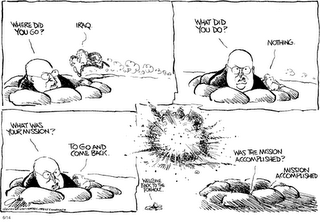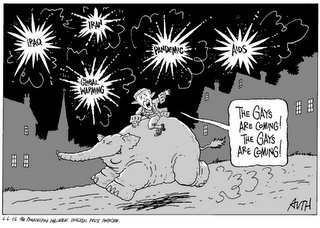[Ed .Note: In violation of my pledge to "lighten things up," the following is a long and rambling post that was motivated by an effort to articulate what I think is the real cause of events like Haditha. It could sorely use a good editor, but, while it may take some patience to find, I think there is something important buried in the verbiage.]
Over the last two days, I have read several op-ed pieces and editorials that attempt to assign blame for Haditha. The first was an essay by
Dan Henninger in yesterday's WSJ. Henninger argues, in effect, that such incidents are an inevitable consequence of war and that the only thing that distinguishes Haditha and similar events during the Viet Nam war from those that occurred in other wars is relentless (and Henninger implies irresponsible, perhaps even disloyal) press coverage. Excerpts:
You knew it had to happen. Haditha, an "incident" involving American troops in Iraq, is now part of the erosion of support for the war in Iraq. The Iraq Syndrome has finally arrived. . . Haditha is indeed the new Abu Ghraib. What this most importantly means is that any U.S. military action overseas now, no matter its level of justification, can be taken down by the significance assigned to events by the modern machinery of publicity. . . One suspects that U.S. troops were party to some awful events in the Pacific and European theaters of World War II, all gone in the mists of history and the enemy's defeat. Not now.
Not surpisingly, Tom Friedman and Maureen Dowd have different perspectives. (Unfortunately you can't read these perspectives unless you pay for a subscription that gives you access to "Times Select," so you will have to trust my elisions).
Friedman agrees that incidents such as Haditha were inevitable but blames that inevitablity not on war itself, but on the mistakes of the Bush Administration:
The report that U.S. marines were involved in a massacre of Iraqis in Haditha — which the Pentagon needs to clarify fast — is a tragic reminder that a foreign occupation by U.S. forces can't go on for years. Most U.S. soldiers in Iraq have done heroic work, but occupations that drag on inevitably lead to Hadithas.
Right now we are paying for all the Bush team's missteps in Iraq: allowing looting after the fall of Baghdad, disbanding the Iraqi Army without an alternative security force or enough U.S. troops in place, fostering a culture of torture at Abu Ghraib and then letting the politics in Iraq drift for months without any outcome.
Maureen Dowd also blames the Bush administration, but does not think such events are inevitable. Rather, after acknowledging that the "troops are under spectacular emotional pressure" as a result of the "neocon con" of pretending that the troops would be met with gratitude rather than an insurgency, she goes on to argue that Haditha was also the result of some moral deficiency in the troops themselves, or at least a few of them:
There's no way to teach someone not to shoot an unarmed woman or child. If somebody doesn't already know why they shouldn't murder a baby, it's not clear that a refresher course will help.
The problem with brushing up on core values is that if you don't know them by a certain point you can't learn them. The problem with brushing up on core values is that if you don't know them by a certain point you can't learn them. You can't teach remedial decency . . . .
As Norman Schwarzkopf said, in a quote that is part of the military's slide show on core warrior values: "The truth of the matter is that you always know the right thing to do. The hard part is doing it."
She also argues that these moral failures are themselves the result of, or at least a reflection of, the moral bankruptcy of the Bush administration, but I will spare you that feverish manifestation of her obsession. If a meteor hit New York, Dowd would write an article from the grave blaming Dick Cheney.
Apart from that, there is some truth in all of these analyses. Henninger grossly exaggerates the power of the press to shape public opinion. In matters such as these, the press is a follower of public sentiment, not a leader. Witness the fawning press coverage of the lead-up to and early days of the Iraq. It was not until the war turned unpopular that the press started its feeding frenzy. The difference between the press coverage of Iraq (and Viet Nam before it) and that of WWII has less to do with the press than it has to do with differences in public support for the wars.
But still, Henninger is doubtless right that incidents like Haditha have happened in all wars, and Friedman and Dowd are right that the terrible emotional stress imposed on troops by a long occupation of another country doubtless contributes to this inevitability. And Friedman and Dowd are also right that errors in the planning and execution of this war contributed to that emotional stress.
But, I think all three miss an even deeper failure that underlies all of this: the failure of the American National Security appartus not just of this administration but of all administrations since at least Viet Nam to recognize that a military built and armed around what worked in World War II is incapable of winning the kinds of wars that militray has been and will be asked to fight in the last quarter of the 20th Century and beyond.
It is almost trite to observe that victorious countries are always ready to re-fight the last war but rarely ready to fight the next one. The French, victors in the static meat grinder of WWI, built the the static Maginot Line and were overrun in less than a month by a new form of war characterized by mobility and maneuver. The United States, victors in WWII built the most mobile military machine the world has ever seen. Yet that machine has been thwarted again and again -- in Vietnam, Lebanon, Somalia and now Iraq and Afghanistan -- by a new sort of war that does not, at bottom, involve armies at all.
Military thinkers from Lao Tzu to Liddell Hart point out that the key to victory in any war is to sieze or destroy the enemy's "center of gravity:" the thing the enemy cannot lose if it is to have any hope of winning. In WWI (and indeed all wars prior to that time), the center of gravity was considered to be the enemy's armies. Over time, though, technological advances (artillery, machine guns, planes, etc.) and improvements in defensive strategy rendered any two armies of even remotely equal capabilities essentially invulnerable to each other. Moroever, systems of alliances among modern nation states assured that, when war came, the armies involved would have essentially equal capabilities. That process culminated in WWI. While WWI failed to be the "war to end all war" it certainly was the war that ended wars in which people other than soldiers were in harm's way.
The "genius" of the German general staff at the outset of WWII was to recognize that the "true" center of gravity was not the armies themselves but the supply lines and communications that supported them. As a result, the German tactics were not to attack armies directly but go after their lines of supply and communication.Once those were captured, rolling up the armies was, with rare exceptions (Staligrad stands out), not much harder than herding sheep into a pen.
The Allies, in defeating Germany, went them one better, realizing that the armies were also dependent on the economies of the countries supporting them. Previously, naval blockades had been used for this purpose, but there had been no way to directly reach a country's means of production without defeating the enemy's armies first. The airplane changed that, and the Allies won WWII first by adopting the German's own tactics of surrounding rather than attacking opposing armies, and second by using a massive advantage in air power to directly strike at the German and Japanes economies and population centers.
In the years since WWII, The United States has focused its military preparedness around a conviction that the key to victory in all future wars would be exactly what it was in WWII: the ability to sieze and hold or destroy the enemy's supply lines, communications and means of production. In pursuit of this conviction, the US has built the most mobile military machine the world has ever known and it has coupled that with an unprecendented strategic bombing capability. The result is an ability to take down not just armies but entire countries in amazingly short periods of time.
The problem, though, is that taking down armies and countries no longer enough to assure victory. Indeed the theory on which the WWiI victory was based -- that lines of supply and communications, means of production, and control of territory represneted the "center of gravity" in war -- is flawed. The true center of gravity is none of these things. The true center of gravity and the thing that must be destroyed if you are to win a war is the enemy's will to fight; its will and willingness to keep fighting no matter what and -- equally importnat -- to bear the consequences of doing so. It in this battle of wills that America lags significantly behind many of the countries in which they now finds itself fighting.
Dan Henninger cames closest to recognizing this when he says "it's the phenomenon of the so-very-public 0.01%--at Abu Ghraib, on an Afghan street, at Haditha--that is breaking America's will this time." But his assumption that the loss of will is caused by press coverage of the realities of war is wrong, and his solution -- don't tell them about those realities -- is just silly.
But he is right in his sense that, at least in a democracy, even a stupefyingly overhwelming military superiority counts for little absent a public will to fight.
Unlike many (Henninger included I suspect), I do not bemoan this "deficeit of will" as a defect in the American character or as a symptom of a decadent, declining civilzation. To the contrary, it is a reflection of something I admire. The will to fight requires, first and foremost, something the fighters believe is worth killing and dying for. For Anericans there are very few of those causes. Americans will readily go to war to avenge an attack on this country and, if they believe the threat is real enough, to prevent such an an attack. But you will never convince Americans that they should go to or stay in a war to spread an ideology, much less to secure oil or territory. That is actually pretty rare in world history.
In most of the wars we have fought since WWII a "cause" sufficient to motivate Americans to fight and keep fighting has not existed. Initially at least, the public believed we had a such cause in Afghanistan and Iraq (correctly in the first case and incorrectly in the second). "But, hey!" they say,"we won those wars! We crushed their armies and occupied their countries. We've won! Why are our solldiers still dying? Why can't those guys just accept the fact that they lost and re-make themsleves in our image? I'll send them money, but if nation-building requires lives, we're outta here!"
Americans, in short, are as much victims of the WWII mindset as their leaders have been. War today is different. Military victory, even total victory, is not enough to win the kinds of war we are being called upon to fight today. Once we have achieved such a victory, we lose the will to fight on, since anything after that is unrelated to any clear and present danger to ourselves or our country. We revert to our essentially peaceful norm. What we have not internalized yet is that, unlike WWII, total victory does not end the adversary's will to fight. In fact, it may actually strengthen that will. As a result, our adversaries still have a cause that they believe to be worth the price. However silly, even evil, those causes may seem to us, the fact remains that in the new wars our adversaies are (and can expected to continue to be) willing to fight and die and keep on fighting an dying in it's name.
So, I do not bemoan America's "lack of will." To the contrary I admire the aspect of our national ethos that underlies it. What I do bemoan, though, is the failure of our political and military leadership to anticipate the shape of the new wars and the disadvanatges we would have in them, and to shape their stratregic and tactical planning around those realities. This failure goes back at least to Viet Nam and it is no less serious (and no les obvious in hindsight) than the French failure to anticipate the effect that planes, tanks and moltorized infantry would have on the Maginot line.
Partly -- perhaps mainly -- this has been a failure of political leadership. Bedazzled by our military capabilities, our leadership has all too often led us into war for causes that Americans simply do not believe are worth the cost. Such public value judgments cannot be changed, at least not for long, by flag-waving, rhetoric, appeals to patriotism or challeneges to theloyalty of those who disagree. For Americans to send its young men and women off to war for any appreciable time and to accept many of them back in caskets or on crutches requires a cause that sells itself: a clear and present danger to ourselves and our way of life.
But there is also a failure of military planning. For military planners, the reasons for a war are irrelevant. Their task is to figure out how to win it. To an extent that should now be clear, the focus of American military planners since WWII has been to confined to assuring that US could do those things it did in WWII better than any other country in the world. They have succeeded spectacularly in that regard. But they failed to adequately apppreciate was that some of the new wars they would be asked to fight would be fundamentally different from WWII and that creating an asymetry, even a massive one, in conventional military might would not be enough.
Even today, we can't quite believe that. But the proof can be found everywhere. To win wars such as those the Israelis have been fighting in Palestine, that the French fought in Algeria, that the British fought in Ireland, that we fought in Viet Nam, that the Russians fought in Afghanistan and that we are now fighting in both Afghanistan and Iraq, it is not enough, perhaps not even necessary, perhaps, in fact, even counter-productive, to do the things that brought us victory in World War II.
The only way for a conventional armed force to attack a committed people's will to fight is to inflct such horrendous casulaties that the populace simply gives up. As the Battle of Britian and all the wars listed above illustrate, killing people in small or even relatively large numbers over a long period of time actually
increases the will of the survivors to fight. To be effective is sapping a people's willingness to fight, the caualities have to be truly massive, sudden and utterly unexpected: Hiroshima and Nagasaki are examples. Short of something like this, the military machine we have built is utterly incapable of winning the one battle that ultimately matters in the types of wars we are invoved in today: the battle of wills.
Friedman comes close to capturing this point when he says:
We are not losing Iraq to the Iraqi Vietcong — traditional nationalists. Iraq has a freely elected nationalist government. No, we are losing in Iraq to sectarian theocrats, Islamo-fascists and local and regional tyrants, who have only one thing in common: the belief that America and its Iraqi allies must fail, that neither modernity nor democracy must be allowed to take root in Iraq.
It will be a global tragedy if they succeed, but it is hard to fight an enemy whose only concern is that you lose, not what happens after. . . . We can't keep asking Americans to sacrifice their children for people who hate each other more than they love their own children.
The distinction Friedman draws between the Viet Cong and the Iraqi insurgents is true but irrelevant. Yes, the Viet Cong were motivated by nationalism where the Iraqis and Afghan Taliban are motivated by sectarianism. But when it comes to winning a war against these groups, that is a distinction without a difference. What unites all three of these groups and what makes them all so difficult to defeat is a passionate belief in a cause for which they are willing to fight on and die for, even in the face of overwhelming military superiorty.
Yes, it is hard to fight such people and it is especially hard when we ourselves are not similarly motivated. But that is the situation we are faced with, and our only alternative to hoping they will just go away or losing is to find a way to win the war of wills.
I do not have any idea how to do that. But one thing does seem clear: we need to get by the idea that we can win these types of wars by doing what we did in WWII. In this context, our faith in our military might is as delusional as the French faith was in the Maginot line.
It's a different world, and the evolutionary maxim continues to apply: adapt or die.






